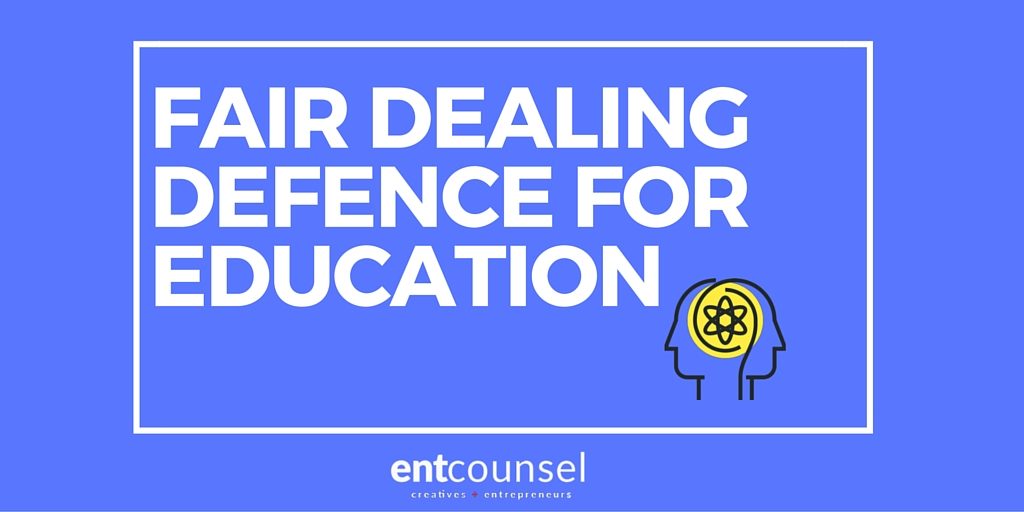Copyright Modernization Act
The Copyright Act was amended on June 29, 2012, with the Copyright Modernization Act (S.C. 2012, c.20) also known as Bill C-11. The amendments permitted fair dealing to now include fair dealing for education as an exception to copyright infringement. The purpose of the Copyright Act (R.S.C. 1985) is to balance the needs of users and creators. However, the new amendments had educational institutions placing more emphasis on the rights of users at the cost of copyright creators. However, a Federal Court case clarified the importance of balancing user and creator rights equally in the context of education with respect the fair dealing exception for education in Canadian Copyright Licensing Agency v. York University, 2017 FC 669 (CanLII),
York University’s Guidelines post The Copyright Modernization Act
As a result of the new amendments with the Copyright Modernization Act, educational institutions falsely interpreted this to mean that they could copy copyright material without permission or payment to a rightsholder though guidelines implemented by the Ontario Ministry of Education – lucky a decision of the Federal Court on July 12, 2017 held that the Access Copyright tariffs certified by the Copyright Board are enforceable and held York University’s guidelines and interpretation of fair dealing for education as unfair. York University stopped paying tariffs to Access Copyright in 2011 by implementing their own guidelines.
The Limits of Fair Dealing for the Purpose of Education – Copyright Modernization Act
Access Copyright sued the university for reproducing copyright-protected works without authorization. York University filed a countersuit seeking to have their internal guidelines for copying for courses declared as fair dealing pursuant to the Copyright Act. The Federal Court determined that York University breached copyright and their actions did not constitute and fall within fair dealing for education.
The exceptions in the Copyright Act permit the use of copyright material without permission or payment in certain circumstances and educations is now an enumerated exception as a result of the Copyright Modernization Act amendments – however, there is a limit to the copying by educational institutions as confirmed by the recent case last year involving York University and Access Copyright. The Canadian exception of fair dealing for the purpose of education is set out below:
Educational Institutions
29.4 (1) It is not an infringement of copyright for an educational institution or a person acting under its authority for the purposes of education or training on its premises to reproduce a work, or do any other necessary act, in order to display it.
- (2) It is not an infringement of copyright for an educational institution or a person acting under its authority to
- (a) reproduce, translate or perform in public on the premises of the educational institution, or
- (b) communicate by telecommunication to the public situated on the premises of the educational institution
a work or other subject-matter as required for a test or examination.
- (3) Except in the case of manual reproduction, the exemption from copyright infringement provided by subsections (1) and (2) does not apply if the work or other subject-matter is commercially available, within the meaning of paragraph (a) of the definition commercially available in section 2, in a medium that is appropriate for the purposes referred to in those subsections.
York University interpreted the Copyright Act amendment to include education as fair dealing as placing more importance on the needs of users rather than seeing it as a balance between users and copyright-protected holders. They issued a policy memorandum to all elementary and secondary schools that promote the rights of users by defining how much copying would be considered fair dealing.
York University’s Copying guidelines & Fair Dealing Guidelines Developed by the Council of Ministers of Education
The Ontario Ministry of Education view that the use of copyright-protected works by educational institutions to be in favour of users was inaccurate. They issued a policy memorandum to all elementary and secondary schools that promotes the rights of users. While there is no question that the Copyright Act provides that the rights of users are to be considered (this was even confirmed by the CCH Canadian case when the decision found that the rights of users further the public interest objectives of the Copyright Act), the needs of users over copyright creators is an incorrect approach to evaluating the exception of fair dealing for education in Copyright Law.
The memorandum adopts the fair dealing guidelines as developed by the Council of Ministers of Education which permits copying of 10% of a work, single article or a chapter from a book as permitted under an Access Copyright license. If this policy was kept in place, it would be a slippery slope and detrimental to copyright-users as a whole.
Fair Dealing for education is now an exception to Copyright Law with certain limits. School Boards follow the “Fair Dealing Guidelines” which is a policy document they use to determined what is “fair dealing” which became effective on December 31, 2012. It is contained in the policy memorandum noted above and can also be found on the Council of Ministers of Education, Canada website. This new amendment means that all employees of elementary and secondary schools are able to use “short excerpts” of copyright-protected materials without obtaining permission and without paying a fee to the copyright owner with some conditions.
This includes the user rights copyright treat, the 2013 Marrakesh Treaty to Facilitate Access to Published Works for Persons Who Are Blind, Visually Impaired or Otherwise Print Disabled. The Treaty notes the balance between the rights of copyright holders with the rights or users as confirmed by the SCC. The Treaty notes that education is one of the public interests that must be recognized. It notes in the preamble that:
Recognizing the need to maintain a balance between the effective protection of the rights of authors and the larger public interest, particularly education, research and access to information, and that such a balance must facilitate effective and timely access to works for the benefit of persons with visual impairments or with other print disabilities.
The Ontario Ministry’s of Education’s memorandum adopted the fair dealing guidelines as developed by the Council of Ministers of Education which permits copying of 10% of a work, single article or a chapter from a book as permitted under an Access Copyright license. This Ministry’s policies meant that all employees of elementary and secondary schools are able to use “short excerpts” of copyright-protected materials without obtaining permission and without paying a fee to the copyright owner with some conditions. The guidelines also permit students and educators to “use publicly available Internet materials for their learning and educational pursuits”. The policy is detrimental to copyright-users.
Canadian Copyright Licensing Agency v. York University, 2017 FC 669 (CanLII)
York University established their own guidelines for “fair dealing” to determine how much-unauthorized copying would fit within the definition. However, in Canadian Copyright Licensing Agency v. York University, 2017 FC 669 (CanLII), the Federal Court of Canada ruled against York University in favour of Access Copyright ordering them to pay for the use of copyright materials copied for students. They evaluated two issues:
1) Whether the copying policies of York University were fair?
2) Was a university able to stop paying the copyright tarrifs or royalties and the tariffs charged by Access Copyright for copying materials voluntary?
The Court’s determination in favour of Access Copyright was definitely a huge win for both creators, copyright holders, and content producers and publishers. The Court rules that the guidelines were not fair dealing and that the copyright tariffs imposed by Access Copyright are mandatory.
The Court notes that the:
“fair dealing guidelines are not fair in either their terms or their application.
The fact that the guidelines could allow for copying of up to 100 percent of the work of a particular author, so long as the copying was divided up between courses, indicates that the guidelines are arbitrary and are not soundly based in principle.
York has not satisfied the fairness aspect of the quantitative amount of the dealing,… There is no explanation why 10 percent or a single article or any other limitation is fair. Qualitatively, the parts copied can be the core of an author’s work, even to the extent of 100 percent of the work.
It is evident that York created the guidelines and operated under them primarily to obtain for free that which they had
previously paid for.It is almost axiomatic …. that allowing universities to copy for free that which they previously paid for would have a direct and adverse effect on writers and publishers.”
The importance of education in the context of copyright is important but not so much at the risk of properly compensating copyright creators. The Ministry’s policies had the effect of placing more importance on users over copyright owners. The SCC in the CCH case (noted below) confirmed in 2004 that the rights of users are to be balanced equally with copyright owners and that fair dealing is not to be interpreted restrictively. CCH Canadian v Law Society of Upper Canada’, 2004 SCC 13, [2004] 1 SCR 339 [CCH]. (CCH)
“[in order to maintain the proper balance between the rights of a copyright owner and users’ interests, [fair dealing] must not be interpreted restrictively.”
The SCC confirmed the importance of education in copyright policy in Alberta (Education) v Canadian Copyright Licensing Agency (Access Copyright), 2012 SCC 37, [2012] 2 SCR 345 [CCLA]. Further, in “History in the Balance: Copyright and Access to Knowledge,” in Geist, Canadian Copyright, author Myra Tawfik notes that the law was designed to encourage learning equally as important to rewarding creators and protecting creators. The importance of education is also emphasized in international policy since the Berne Convention in 1886.
York University intends to appeal the ruling. Interpreting the exceptions to copyright infringement as a result of the amendments by The Copyright Modernization Act in the context of copying for the purpose of education cannot be without limits and a recognition of the balance between users and creators – and we are glad that the Federal Court has set the record straight. Otherwise, the rights of creators to be rewarded and incentivized for their efforts and original works diminishes – leaving less creativity and originality in the world. Read more about fair dealing here.



